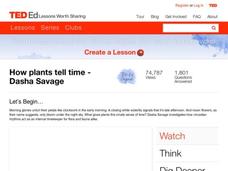SciShow
Why Are These Bees STABBING Plants?
Humans know a lot about bees, seeing as they impact both our ecology and our economy. But there's something about bumble bees that we totally missed until recently; a super weird and mysterious behavior that might give them a leg up in...
SciShow
Why Are These Bees STABBING Plants?
Humans know a lot about bees, seeing as they impact both our ecology and our economy. But there's something about bumble bees that we totally missed until recently; a super weird and mysterious behavior that might give them a leg up in...
SciShow
Why Do Bees Buzz?
There are more than 20,000 species of bees, all of which buzz when they fly, and many of which also do it to communicate. But some bees buzz for a completely different reason that has nothing to do with communication or flight!
Curated Video
Mendelian Genetics and the Laws of Herdity
Join us as we dive into the fascinating world of genetics, guided by the Father of Genetics himself, Gregor Mendel. We'll explore the laws of heredity Mendel formulated from his groundbreaking experiments with pea plants and learn how...
Mazz Media
Living
This live-action video program is about the term living thing. The program is designed to reinforce and support a student's comprehension and retention of the term living thing through use of video footage, photographs, diagrams and...
Nature League
Exploring Plants | Compilation
Brit looks back on our seventh month on Nature League, when we explored the theme of plants.
MinuteEarth
Orchids: The Masters Of Lying, Cheating & Stealing
Thanks to Curtin University and the University of Western Australia for sponsoring this video. Also, special thanks to Kingsley Dixon and the Orchid Specialist Group of the IUCN’s Species Survival Commission. ______ If you want to learn...
SciShow
Why Tomatoes Are Fruits, and Strawberries Aren't Berries
Did you know that bananas are berries, but strawberries aren’t? A lot of thought goes into classifying fruits and vegetables, and it all has to do with anatomy. Hosted by: Hank Green ---------- SciShow has a spinoff podcast! It's called...
MinuteEarth
Nature Has a Backup Plan And...
Signup for your FREE trial to Wondrium here: http://ow.ly/AOkb30sfmak Who needs redundancy? Well, everyone, it turns out. LEARN MORE ************** To learn more about this topic, start your googling with these keywords: - Ecological...
Natural History Museum
What Extinction Means for Our Planet | Our Broken Planet
Nature is declining globally at an unprecedented rate. The primary driver of extinction is human land-use change, over half of which is to make way for agriculture. Over one million plant and animal species are predicted to face...
Curated Video
Understanding Fertilization and Seed Formation
This video explains the process of fertilization and how it results in the formation of seeds and fruit. It describes how male and female gametes fuse to form a zygote and how pollination and fertilization occur. The video also...
SciShow
How an Ancient Remedy Became a Modern Cure for Malaria
In the 1960s drug-resistant strains of malaria emerged, making the disease even deadlier than before. Then, pharmaceutical scientist Tu Youyou discovered a promising new remedy buried within the pages of ancient Chinese texts.
Mazz Media
Life Cycle
This live-action video program is about the term life cycle. The program is designed to reinforce and support a student's comprehension and retention of the term life cycle through use of video footage, photographs, diagrams and...
Curated OER
Life Cycle of a Flowering Plant
The development of the male and female gametes in a plant is illustrated, explaining plant fertilization, pollination, and reproduction. Overall, get a complete picture of the life cycle of a flowering plant with some wonderful details...
TED-Ed
How Plants Tell Time
Can someone really have a "biological clock"? Discover why many organisms on earth have an inherent awareness of where they are in the day's cycle.This video discusses animal adaptations, the earth's revolutions, and how light and...
Crash Course
The Sex Lives of Nonvascular Plants: Alternation of Generations
Plants evolved more than 400 million years ago into two types — vascular and nonvascular. Here's a video that explains the difference between vascular and nonvascular plants and then focuses on the over 24,000 types of nonvascular...
California Academy of Science
Why Protect Pollinators?
Would you rather having biting flies or chocolate? The question may seem absurd, but cocoa trees rely on pollination from biting flies. Viewers come to understand the importance of pollinators to our food supply, flowers, and entire...
PBS
How Sex Became a Thing
Birds, bees, flowers, trees ... and Funisia dorothea? Biology scholars journey back in time to discover more about the history of sexual reproduction. The video, one of many in a biology playlist, covers our earliest eukaryotic ancestor,...
SciShow
10 Plants That Could Kill You
Why shouldn't you eat that? The video gives an overview of several plants that are deadly to humans. The presenter explains the history and chemistry of each of the plants.












